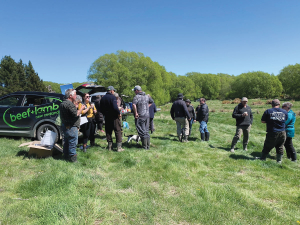NZ Catchment Groups Thrive with ‘Source to Sea’ Approach
The most successful catchment groups in NZ are those that have 'a source to sea' approach.
 The Thomson Creek Catchment Group was set up in 2019 to primarily address the freshwater health and water quality issues identified within the catchment.
The Thomson Creek Catchment Group was set up in 2019 to primarily address the freshwater health and water quality issues identified within the catchment.
Over the last two and a half years, Beef + Lamb New Zealand (B+LNZ) has worked on a project to improve the freshwater health catchment groups from across the country, with help from the Ministry for Environment's (MfE) Freshwater Improvement Fund. One of these groups is the Thomson's Creek Catchment Group in Central Otago.
Thomson's Creek is situated near Omakau in Central Otago and runs from nearby hills in the Manuherekia River.
The Otago Regional Council identified Thomson Creek as having water quality issues due to historical goldmining activities in the area and current land use in the catchment.
The Thomson Creek Catchment Group was set up in 2019 to primarily address the freshwater health and water quality issues identified within the catchment. It was established by local dairy farmer, Hamish Stratford, who had recently moved from Canterbury.
"We're on the edge of the Thomson Creek catchment and we became aware that there were some slight environmental tweaks needed for the area, so together as a community we worked to do something about it," Stratford explains.
"We came together at the golf clubrooms located in the catchment and set our values which focues on our love of water and the creek being the centre of our community.
"We identified what we love about the catchment and what we wanted to improve. It took a couple of years to get to where we are now, but we're really pleased with the progress and look forward to the continuous improvement."
In late 2019, four consultants were employed with help from B+LNZ and funding from MfE to work with every farmer in the Thomson Creek catchment to create an individual Farm Environment Plan specific to each farm.
The farm plans were used to help each farmer determine the appropriate actions to take on their farm to minimise and mitigate the risks of farming activities on waterways as well as run efficient farming businesses.
Nicola McGrouther, one of the four consulatants, became the catchment group facilitator working alongside farmers to help them understand their stream health and improve the water quality.
Prior to the establishment of the catchment group, farmers were already implementing some changes such as using efficient spray irrigation rather than inefficient flood irrigation to reduce sediment and nutrient run-off into the sluice channel and Thomson's Creek.
"Having a facilitator such as Nicola and consultants help construct Farm Environment Plans has meant farmers are able to identify issues and implement changes on their farm that imoact the catchment. The formation of a steering group within the catchment has also helped to drive progress," says Tom Orchiston B+LNZ's environment capability - South Island.
One of the outcomes of the initial project was that the group is in phase one of another MfE funded project to continue to work with farmers to support them to improve freshwater health, build fish barriers to protect native galaxiids and investigate the development an active wetland. Funding from MfE under the Manuherekia Exemplar Catchment in conjunction with the Thomson Creek Catchment is being utilised for this project.
"It's great to see the group building on the success of the pilot project with their active wetland initiative," says MfE's director of policy implementation Lorena Stephen. "I am proud that the ministry can continue to support this important mahi and help the catchment to achieve positive water quality outcomes."
The ultimate goal of the Thomson Creek Community Catchment Group, like many others, is maintain healthy, clean water in catchment waterways.
Stratford says they would also like to get a few more people involved in the catchment including people from their township to build their understanding of what farmers are doing to improve their environment and have been doing for a long time.
Federated Farmers is celebrating following the Government's announcement that young farmers will be able to use their KiwiSaver funds to buy their first home or farm.
The Meat Industry Association of New Zealand (MIA) today announced that Chief Executive Officer Sirma Karapeeva has resigned from the role.
The winners of the 2026 Hawke’s Bay/Wairarapa Dairy Industry Awards were announced at the annual awards dinner held at Copthorne Solway Park in Masterton on Thursday evening.
Environment Southland is welcoming this week’s decision by the Environmental Protection Authority (EPA) to approve the release of Blaptea elguetai, a leaf‑feeding beetle that will help control the highly invasive Chilean flame creeper.
This March, the potato industry is proudly celebrating International Women’s Day on 8 March alongside the International Year of the Woman Farmer, recognising the vital role women play across every part of the sector — from paddocks and packhouses to research, leadership, and innovation.
Fruit trader Seeka posted a record profit and returns to shareholders in 2025.

OPINION: A mate of yours truly reckons rural Manawatu families are the latest to suffer under what he calls the…
OPINION: If old Winston Peters thinks building trade relations with new nations, such as India, isn't a necessary investment in…